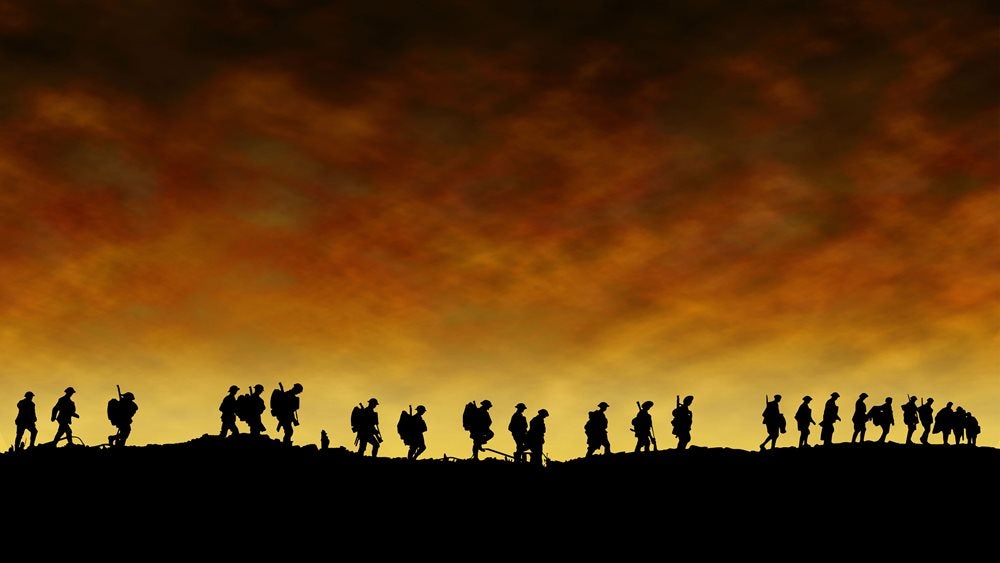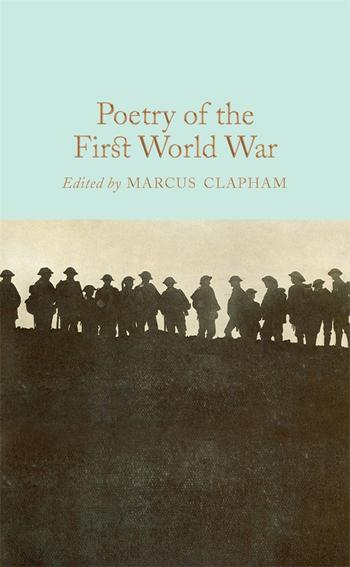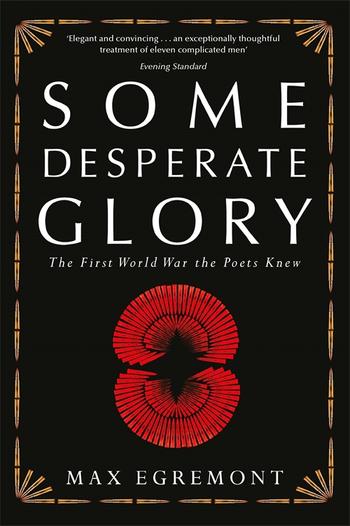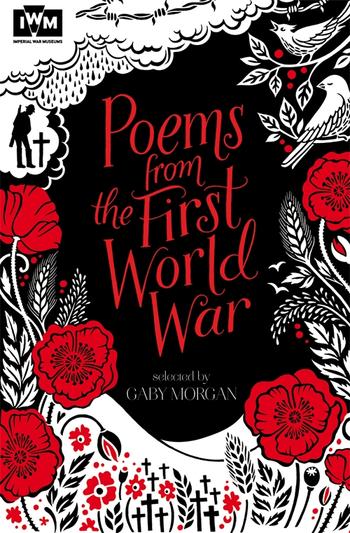A Thousand Brave Young Men Went in and Didnt Come Out Again Poem
The poesy of the First World State of war
A collection of poems inspired by Earth War One, featuring poems by Offset World War poets including Siegfried Sassoon, Rupert Brooke and Wilfred Owen.

The Beginning World War inspired profound poetry – words in which the temper and landscape of battle were evoked maybe more vividly than ever earlier.
The First Earth War poets – many of whom lost their lives – became a collective voice, illuminating non just the state of war'due south tragedies and their irreparable effects, just the hopes and disappointments of an entire generation.
Although it has been more than one hundred years since the Ceasefire and the finish of the Start Globe War, it continues to move and inspire poets, with Carol Ann Duffy penning a sonnet, 'The Wound in Fourth dimension', every bit part of a series of special Remembrance Day events organised by film director Danny Boyle in 2018.
Aslope 'The Wound in Time', here we've curated a collection of merely some of the nigh poignant World War One poems, featuring the writing of the famous soldier poets, Siegfried Sassoon, Rupert Brooke and Wilfred Owen, alongside the First World War poetry of nurses, mothers, sweethearts and family and friends who experienced the war from entirely dissimilar perspectives. These poems give a profound insight into this period of history.
Love verse? Discover our edit of the best verse books.
The Beginning World War inspired profound poetry – words in which the temper and landscape of battle were evoked maybe more vividly than ever earlier.
The First Earth War poets – many of whom lost their lives – became a collective voice, illuminating non just the state of war'due south tragedies and their irreparable effects, just the hopes and disappointments of an entire generation.
Although it has been more than one hundred years since the Ceasefire and the finish of the Start Globe War, it continues to move and inspire poets, with Carol Ann Duffy penning a sonnet, 'The Wound in Fourth dimension', every bit part of a series of special Remembrance Day events organised by film director Danny Boyle in 2018.
Aslope 'The Wound in Time', here we've curated a collection of merely some of the nigh poignant World War One poems, featuring the writing of the famous soldier poets, Siegfried Sassoon, Rupert Brooke and Wilfred Owen, alongside the First World War poetry of nurses, mothers, sweethearts and family and friends who experienced the war from entirely dissimilar perspectives. These poems give a profound insight into this period of history.
Love verse? Discover our edit of the best verse books.
'It'south necessary to dissever politics, even history, from the verse. The work of the British Commencement World State of war poets tin can be seen as one of the most powerful collective statements non only against what happened on the western forepart simply confronting all war.'
Max Egremont, Some Drastic Glory
The Wound in Time
Carol Ann Duffy
It is the wound in Time. The century's tides,
chanting their bitter psalms, cannot heal information technology.
Non the war to end all wars; death'south birthing place;
the earth nursing its ticking metallic eggs, hatching
new carnage. Just how could you know, brave
as conventionalities equally you boarded the boats, singing?
The end of God in the poisonous, shrapneled air.
Poetry gargling its own blood. We sense it was dear
you gave your world for; the town squares silent,
pending their cenotaphs. What happened side by side?
War. And later on that? War. And now? State of war. War.
History might also be water, chastising this shore;
for we learn nothing from your endless sacrifice.
Your faces drowning in the pages of the sea.
G.K. Chesterton
Elegy in a State Churchyard
The men that worked for England
They have their graves at home:
And bees and birds of England
Well-nigh the cross can roam.
But they that fought for England,
Following a shooting star,
Alas, alas for England
They have their graves afar.
And they that rule in England,
In stately conclave met,
Alas, alas for England
They have no graves every bit yet
The Soldier
Rupert Brooke
If I should dice, recall only this of me:
That there's some corner of a foreign field
That is for ever England. There shall be
In that rich earth a richer dust curtained;
A dust whom England bore, shaped, made enlightened,
Gave, once, her flowers to love, her means to roam,
A trunk of England's, breathing English language air,
Washed by the rivers, blest by suns of habitation.
And retrieve, this heart, all evil shed away,
A pulse in the eternal mind, no less
Gives somewhere back the thoughts by England
given;
Her sights and sounds; dreams happy as her solar day;
And laughter, learnt of friends; and gentleness,
In hearts at peace, nether an English heaven.
Reported Missing
Anna Gordon Keown
My idea shall never be that you are dead:
Who laughed so lately in this quiet place.
The dear and deep-eyed sense of humor of that confront
Held something ever living, in Death's stead.
Scornful I hear the flat things they have said
And all their piteous platitudes of hurting.
I laugh! I laugh! – For you will come again –
This middle would never beat if you were dead.
The globe'due south adrowse in twilight hushfulness,
There's purple lilac in your little room,
And somewhere out across the evening gloom
Small boys are alternative summertime watercress.
Of these familiar things I have no dread
Being so very sure you lot are not dead.
Dulce et Decorum Est
Wilfred Owen
Aptitude double, like old beggars nether sacks,
Knock-kneed, coughing similar hags, nosotros cursed through sludge,
Till on the haunting flares we turned our backs
And towards our distant rest began to trudge.
Men marched asleep. Many had lost their boots
But limped on, claret-shod. All went lame; all blind;
Boozer with fatigue; deafened even to the hoots
Of tired, outstripped Five-Nines that dropped behind.
Gas! GAS! Quick, boys! - An ecstasy of fumbling,
Fitting the clumsy helmets just in time;
But someone yet was yelling out and stumbling
And flound'ring like a man in burn down or lime ...
Dim, through the misty panes and thick green light,
Every bit under I greenish ocean, I saw him drowning.
In all my dreams, before my helpless sight,
He plunges at me, guttering, choking, drowning.
If in some smothering dreams you too could step
Behind the wagon that we flung him in,
And picket the white eyes writhing in his face,
His hanging confront, similar a devil'south sick of sin;
If you could hear, at every jolt, the blood
Come gargling from the barm-corrupted lungs,
Obscene every bit cancer, bitter as the cud
Of vile, incurable sores on innocent tongues, --
My friend, yous would not tell with such high zest
To children ardent for some desperate glory,
The old lie:Dulce et decorum est
Pro patria mori.
Searchlight
F. Southward. Flint
There has been no sound of guns,
No roar of exploding bombs;
Just the darkness has an edge
That grits the nerves of the sleeper.
He awakens;
Nothing disturbs the stillness,
Salvage perhaps the light, tedious flap,
Once simply, of the curtain
Dim in the darkness.
Nevertheless there is something else
That drags him from his bed;
And he stands in the darkness
With his anxiety cold against the floor
And the cold air circular his ankles.
He does not know why,
Simply he goes to the window and sees
A beam of light, miles loftier,
Dividing the dark into two earlier him,
Nevertheless, stark and throbbing.
The houses and gardens below
Lie under the snow
Placidity and tinged with purple.
There has been no audio of guns,
No roar of exploding bombs;
Just that watchfulness hidden among the snow-covered houses,
And that keen beam thrusting back into heaven
The light taken from it.
Easter Monday (In memoriam Eastward.T.)
Eleanor Farjeon
In the last letter that I had from France
You thanked me for the silverish Easter egg
Which I had hidden in the box of apples
Y'all liked to munch beyond all other fruit.
You constitute the egg the Monday earlier Easter,
And said, 'I volition praise Easter Mon now –
It was such a lovely morning'. And then you spoke
Of the coming battle and said, 'This is the eve.
Good-bye. And may I accept a letter soon.'
That Easter Monday was a day for praise,
It was such a lovely morning. In our garden
We sowed our earliest seeds, and in the orchard
The apple-bud was ripe. It was the eve.
There are three messages that you will not become.
To His Love
Ivor Gurney
He's gone, and all our plans
Are useless indeed.
Nosotros'll walk no more on Cotswold
Where the sheep feed
Quietly and take no heed.
His trunk that was so quick
Is not as you
Knew it, on Severn river
Under the blue
Driving our small gunkhole through.
You would not know him now . . .
Simply still he died
Nobly, so cover him over
With violets of pride
Regal from Severn side.
Encompass him, cover him shortly!
And with thick-set
Masses of memoried flowers—
Hide that red wet
Affair I must somehow forget.
Break of Day in the Trenches
Isaac Rosenberg
The darkness crumbles away.
It is the same old druid Time equally ever,
Merely a live matter leaps my manus,
A queer sardonic rat,
As I pull the parapet's poppy
To stick behind my ear.
Droll rat, they would shoot you if they knew
Your cosmopolitan sympathies.
Now you have touched this English hand
You volition practise the same to a German language
Soon, no doubt, if it be your pleasure
To cross the sleeping light-green between.
It seems yous inwardly smiling as yous pass
Strong eyes, fine limbs, haughty athletes,
Less chanced than you for life,
Bonds to the whims of murder,
Sprawled in the bowels of the earth,
The torn fields of France.
What do yous see in our eyes
At the shrieking iron and flame
Hurled through still heavens?
What quaver — what center aghast?
Poppies whose roots are in homo's veins
Drib, and are e'er dropping;
Just mine in my ear is safe —
Just a little white with the dust.
The Lament of the Demobilized
Vera Brittain
'Four years,' some say consolingly. 'Oh well,
What'southward that? You're young. Then it must have been
A very fine feel for you lot!'
And they forget
How others stayed behind and just got on—
Got on the better since we were away.
And we came home and found
They had achieved, and men revered their names,
But never mentioned ours;
And no i talked heroics now, and we
Must merely get back and beginning over again once more.
'You lot threw iv years into the melting-pot—
Did y'all indeed!' these others cry. 'Oh well,
The more fool you!'
And we're beginning to agree with them.
Reconciliation
Siegfried Sassoon
When you are standing at your hero's grave,
Or almost some homeless village where he died,
Retrieve, through your heart'south rekindling pride,
The German soldiers who were loyal and brave.
Men fought like brutes; and hideous things were done,
And you have nourished hatred harsh and bullheaded.
But in that Golgotha perhaps y'all'll observe
The mothers of the men who killed your son.
An Irish gaelic Airman Foresees His Death
West. B. Yeats
I know that I shall meet my fate
Somewhere amidst the clouds above;
Those that I fight I do not hate,
Those that I guard I do non love;
My country is Kiltartan Cantankerous,
My countrymen Kiltartan's poor,
No likely end could bring them loss
Or go out them happier than before.
Nor law, nor duty bade me fight,
Nor public men, nor cheering crowds,
A lonely impulse of delight
Collection to this tumult in the clouds;
I balanced all, brought all to mind,
The years to come seemed waste of jiff,
A waste of breath the years behind
In balance with this life, this death.
As the Team's Head Brass
Edward Thomas
As the squad's head brass flashed out on the turn
The lovers disappeared into the wood.
I sat amongst the boughs of the fallen elm
That strewed an bending of the fallow, and
Watched the plow narrowing a yellow foursquare
Of charlock. Every time the horses turned
Instead of treading me downwards, the ploughman leaned
Upon the handles to say or ask a word,
Nigh the atmospheric condition, next nearly the war.
Scraping the share he faced towards the forest,
And screwed along the furrow till the brass flashed
Over again.
The blizzard felled the elm whose crest
I sabbatum in, by a woodpecker's round hole,
The ploughman said. 'When will they take it away?'
'When the war's over.' So the talk began—
One infinitesimal and an interval of ten,
A infinitesimal more than and the same interval.
'Have you been out?' 'No.' 'And don't want to, perhaps?'
'If I could just come up back again, I should.
I could spare an arm. I shouldn't want to lose
A leg. If I should lose my head, why, so,
I should want nothing more than. . . . Have many gone
From hither?' 'Aye.' 'Many lost?' 'Yes, a good few.
Simply two teams piece of work on the farm this year.
One of my mates is dead. The 2d day
In France they killed him. It was back in March,
The very night of the blizzard, as well. Now if
He had stayed here nosotros should take moved the tree.'
'And I should non accept sat hither. Everything
Would have been unlike. For it would take been
Some other world.' 'Ay, and a better, though
If nosotros could see all all might seem good.' Then
The lovers came out of the wood again:
The horses started and for the last time
I watched the clods crumble and topple over
Subsequently the ploughshare and the stumbling team.
Read Max Egremont, author of Some Drastic Glory , on the soldier poets of the First Globe State of war .
Poetry of the Outset Globe War
past Marcus Clapham

This beautiful Macmillan Collector'due south Library anthology brings together the major poets of World War One, including Rupert Brooke, Siegfried Sassoon and Wilfred Owen, alongside many others whose voices are less well known.
Some Desperate Glory
past Max Egremont

InSome Desperate Glory, historian and biographer Max Egremont gives united states of america a transfiguring look at the life and work of the poets of Earth State of war I. Wilfred Owen with his flaring genius; the intense, compassionate Siegfried Sassoon; the composer Ivor Gurney; Robert Graves who would later spurn his state of war poems; the nature-loving Edward Thomas; the glamorous Fabian Socialist Rupert Brooke; and the shell-shocked Robert Nichols all fought in the state of war, and their poetry is a bold act of creativity in the face of unprecedented destruction.
Poems from the Commencement World War
past Gaby Morgan

Information technology often seems every bit though more writers and poets fought in The Somme than in whatever other battle in history. The work of the soldier poets and writers who served at the Somme, Siegfried Sassoon, Robert Graves and Wilfred Owen to name but a few, has informed the pop understanding of this dreadful historical event ever since.
Published to mark the centenary of the First World War, this is a moving and powerful collection of poems written by soldiers, nurses, mothers, sweethearts and family and friends who experienced WWI from dissimilar standpoints.
Source: https://www.panmacmillan.com/blogs/literary/the-poetry-of-the-first-world-war
0 Response to "A Thousand Brave Young Men Went in and Didnt Come Out Again Poem"
Post a Comment